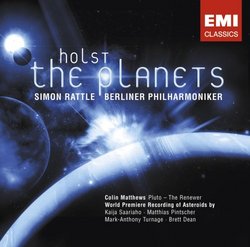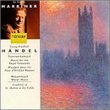| All Artists: Brett Dean, Gustav Holst, Colin [Composer] Matthews, Matthias Pintscher, Kaija Saariaho, Mark-Anthony Turnage, Simon Rattle, Berlin Philharmonic Orchestra Title: The Planets Members Wishing: 0 Total Copies: 0 Label: EMI Classics Original Release Date: 1/1/2006 Re-Release Date: 9/12/2006 Album Type: Enhanced Genre: Classical Styles: Chamber Music, Historical Periods, Classical (c.1770-1830) Number of Discs: 1 SwapaCD Credits: 1 UPC: 094636969022 |
Search - Brett Dean, Gustav Holst, Colin [Composer] Matthews :: The Planets
 | Brett Dean, Gustav Holst, Colin [Composer] Matthews The Planets Genre: Classical
Is it chance or serendipity that Simon Rattle and the Berlin Philharmonic timed their new recording of Holst's The Planets to coincide with the current astronomical upheaval? Though Holst learned of the discovery of Pluto ... more » |
Larger Image |
CD DetailsSynopsis
Amazon.com Is it chance or serendipity that Simon Rattle and the Berlin Philharmonic timed their new recording of Holst's The Planets to coincide with the current astronomical upheaval? Though Holst learned of the discovery of Pluto four years before he died, it probably did not occur to him to add another movement, especially since the work's last section, "Neptune, the Mystic," ends in an other-worldly, ethereal fade-out, enhanced by an off-stage wordless women's chorus. He would have been surprised by the latest development in Pluto's status, but undoubtedly pleased that his ultimately incomplete Suite-- which had become more popular than he had expected or thought it deserved--had inspired another British composer, Colin Matthews, to write a successful companion piece, "Pluto, the Renewer," in 2000. Moreover, the Berlin Philharmonic added to Holst's galaxy by commissioning four composers to write a movement each for a Suite called "Asteroids." This is its premiere recording. The idea of "music of the spheres" goes back to antiquity; perhaps the most famous example of its influence is the slow movement of Beethoven's second "Rasumovsky" String Quartet. Holst gives each of his planets its mythological characteristics: "Mars" is forcefully war-like, "Venus" melodiously peaceful; "Mercury" is a fleet, skittish Scherzo, "Jupiter" rambunctious but suddenly songful. "Saturn" is a soft, solemn march, and "Uranus" murmurs and glitters. The work's most striking element is the scoring. A huge orchestra produces enormous contrasts (underlined by the recording), incredibly colorful sound effects and lush, dense, sonorities, with a lot of melodic doubling and undulating accompanying figures. The sound-world of the "Asteroids" is also based on instrumental colors and effects: whispers, shimmers, crashes and extreme registers. All this is just right for this virtuoso orchestra. Edith Eisler Similar CDsSimilarly Requested CDs
|
CD ReviewsA worthy musical view of space that eschews bombast Larry VanDeSande | Mason, Michigan United States | 04/23/2007 (4 out of 5 stars) "This recording will forever be remembered as the commodity that arrived simultanous with Pluto being decertified as a planet in 2006. It appears this was more happenstance than providence or marketing plan by DG since Simon Rattle's notes indicate he made these concert recordings after not conducting "The Planets" for more than 20 years. His notes also indicate his desire to include the second recording of Colin Matthews' "Pluto". This concert (some call it "live") recording of "The Planets" strikes me as geared more to musical values than bombast, perhaps being more studied than necessary, and/or executed more for refinement than grandiloquence. Whichever one you subscribe to, I think you get the point -- this recording won't compete with those that go for broke boastfully and/or emotionally but it works on the same level as Claudio Abbado's famous Vienna Philharmonic version of Tchaikovsky's 4th Symphony: it makes music where many others make noise. My personal favorite recording of "The Planets" is Adrian Boult's 1950s-era mono recording with the London Philharmonic (then called the Promenade Philharmonic) that once arrived on a $1.99 Westminster LP and was wretchedly engineered in fake stereo. That recording is still available in good mono via a Haydn House burn of pretty good quality, made from the LP where you can still hear an occasional rough patch of the needle. Where Rattle's 2006 recording sets a somewhat stodgy pace so you can hear every instrument and every turn of the score, Boult's old recording goes full speed ahead with the largest possible voice most of the time, made from an aural perspective at the podium. The two recordings do not actually compete with each other; I find each has qualities I enjoy. I like Rattle's new version as a modern alternative. It is well-recorded in a dimension of clarity in league with Rattle's earlier recording of Mahler's "Symphony of the Thousand". In addition, I find Rattle's toned down version far more palatable than the last modern recording of "The Planets" I listened to, the inadequate, impersonal and shallow version by John Gardiner, also on DG and billed as a stereo spectacular, that is mated to Percy Grainger's noisy "The Warriors". The only thing spectacular about Gardiner's version is how loud the band can play without saying anything. It seems incredible to me someone of Gardiner's stature would record a warhorse like "The Planets" without having any perspective on the music. Back to this version...the disc 2 rarities, "Asteroid 4179: Toutatis", "Towards Osiris", "Ceres" and "Komarov's Fall", all sound like 1950s serial compositions to me. They add something to the overall project, and are interesting to talk about, but none seem to have much appeal on their own. Only the final "Komarov's Fall" seems really to have a beginning, middle and end. The other remind me of the stuff I used to hear on my PBS station's Friday night "Music from the Heart of Space" series. The second disk also carries a DVD on the making of "The Planets" I haven't witnessed. So, all things considered, I think this is a good bargain for Amazon shoppers looking for a modern recording of "The Planets". When I wrote this there were a half-dozen vendors selling it used for less than $10. Unless you are really sold on cellophane, getting this two-CD 2006 production for $6.15 -- as one vendor is offering today -- is a good buy regardless of how many issues of "The Planets" you have hanging around your house." Space Junk Mark Shanks | Portland, OR | 09/27/2006 (3 out of 5 stars) "Rattle disappoints in a perfunctory reading of one of the most familar of concert warhorses. Mars is a bit "oogie-boogie" scary, not terrifying. Venus sulks in a warm bath of ultra-rubato. Rattle himself seems slightly embarrassed by the great central hymn of Jupiter, calling it "a nostalgic look at an England that never existed - the England of cricket fields and warm beer and bad cooking". Well, then - guess that shows US. But the most egregrious offense is cobbling together unwanted bits to, in Rattle's own words, "make a calling card for the orchestra". (Wow, that's ego for you! The Berlin Philharmonic needs a "calling card", and this dweeb is the guy to give it to them? Oh, brother!!!!) It's really just make-work for a group of completely unrelated compositional styles and the results are underwhelming in the extreme. It's bad enough that Pluto has been "downgraded" from planetary status - it now has to suffer the insult of being tagged "The Renewer" (for entirely obscure reasons) and having a tacky, alternately whispy and annoying six-minute noise-bomb associated with it. (The composer, Colin Matthews, is far better known as the producer of the Nonesuch recording of the Gorecki Third Symphony than as an orchestral composer.) Adding this piece after the ephemeral fade-out of Neptune makes as much sense as sticking chrome-plated plastic arms on the Venus d'Milo. None of the other bits (specially commissioned, and boy do they sound like it) would make it on their own merits. As a bonus: there's a 10-minute video of Rattle discussing all this, but even that wears its welcome out quickly, too. (Hubble photos mixed with film of Rattle wearing the world's baggiest shirt match the uneven tone of this entire package.) I give it three stars for curiosity value only. The "Planets" themselves aren't anything special - there doesn't seem to be any reason for this other than to promote the add-ons. Steinberg's recording is far more involving, as are any one of Boult's instead." Big names produce lacklustre results MartinP | Nijmegen, The Netherlands | 09/29/2006 (2 out of 5 stars) "A website, a "making-of"enhanced CD feature, a rave review in Gramophone (it is Rattle, after all) - expectations for this issue are highly strung. Unfortunately, the sounds as such do not live up to them. This is a strangely bloodless traversal of the planetary system, with Rattle seemingly determined to go all subtle and turn the music into some kind of Rococo filigree. As in his Mahler recordings, the result can sound deliberate and mannered. Granted, at times it is definitely successful: Venus is simply breathtakingly beautiful, and Mercury's fleet-footedness is dazzling. But Mars is without menace (and without organ too, by the sound of it); Jupiter is unexhilerating, Uranus just OK but nothing more (and again, not a trace of the organ even in that spectacular upward glissando); Saturn and Neptune, finally, are seriously lacking in any sense of mystery. I suspect the recording itself is partly to blame; EMI engineering is, in my experience, rarely top notch, and the Berlin Philharmonie notoriously difficult acoustically speaking. On CD, there is lack of detail, the dynamic range does not expand quite as widely as one would hope, and strings can sound strangely lacklustre and thin. Worse though is the distancing of the woodwinds, who at times sound as if they were sent out of the hall to keep the female choir company. Then again, that choir, sounds too near rather than distant.
Overall, and taking into account engineering deficits, this may be an acceptable account of The Planets, but it is at best a very pale cousin to the top choice readings by Dutoit, Gardiner or Andrew Davis. Unlike those, however, it offers a bonus in Colin Matthews's Pluto, and four additional "Asteroids" of yet more recent date. Though the promotion of contemporary composers by such a venerable ensemble is laudable, I must admit that for me these extras did very little to heighten the appeal of this set. Pluto starts even before Neptune has quite faded out, but presenting it as an integral part of the Holst only furthers the impression that it has nowhere near the stature of the other Planets. Like three of the four Asteroids, it presents the listener with a depersonalized, generic modernism that relies heavily on extreme sound effects (harmonics, sul ponticello), jarring transitions, unrelieved dissonance, random glissandi on harps or celesta, distant percussion rumblings, and general forgettability. You'll find this kind of music in any B-horror movie soundtrack. The one exception is Turnage's "Ceres", which has just enough rhythmic and harmonic contour to sustain the impression of architectural coherence, and is indeed an interesting piece (though it still remains very much in the shade of Holst's genius). Only for die-hard Rattlites. " |

 Track Listings (8) - Disc #1
Track Listings (8) - Disc #1









